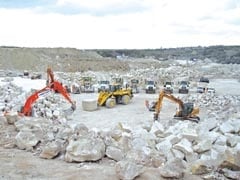Stone Firms game plan to extract stone from protected coastline
Portland quarry company Stone Firms have been making headlines on the television and in newspapers in Dorset, and even in The Times, by proposing to quarry stone from part of Portland’s section of the Jurassic Coast, one of the most protected coastlines in the world.
Planning permission to quarry the area was given in 1951 when Portland limestone was needed to repair the damage to London caused during World War Two. No stone was extracted at that time but the permission remains valid until 2042.
Since 1951 the coastal area of the permitted quarry site has become part of the Jurassic Coast and designated a Unesco World Heritage Site, a Site of Special Scientific Interest, a European Special Area of Conservation and a Regionally Important Geological Site.
Environmentalists and people living nearby have objected to Stone Firms’ plans and a petition on the Prime Minister’s No10 website calling for the quarrying to be prevented had earlier this month (January) been signed by nearly 2,000 people.
Stone Firms know they will not be allowed to hack blocks of stone out of the coast but their proposal to move on to the site and start working it in February was intended to force Dorset County Council’s hand.
Tim Clotsworthy, Estates Manager for Stone Firms, says there are around 300,000tonnes of some of the finest quality stone with beds of up to 2m on the site they want to work. That could be worth about £75million.
Stone Firms have been talking to the county council about developing reserves since they took over the quarries formerly owned by Hanson in 2005. In 2007 they presented to the council their proposals to quarry the coastal region in 14 phases over 25 years, restoring each phase behind them. “It took the council nearly a year to get it to their committee,” says Tim.
The planning committee met in September and since then Stone Firms have been waiting for the council to issue a modification order that will amend the planning permission. They anticipate they will be told they cannot quarry nearer than a certain distance from the cliffs. They will then claim compensation from the County Council for the stone they are not allowed to extract and will start working the area behind that.
But, having waited four months since the planning committee met, they decided to notify the council of their intention to implement the existing planning consent, which they did on 5 January.
“It was a game plan because we were fed up with waiting,” says Tim. “There’s 150,000m3 of stone there. We can’t just sit back and wait to see what they’re going to do.”
There is an element of urgency for Stone Firms because they anticipate reserves at their Coombefield Quarry will be exhausted within six months, although they say they have enough extracted stone on the ground to last for about two years.
Opening a new quarry takes time and is expensive. Having sold the site of their existing workshop to Tesco, they say they plan to relocate their works and invest in new machinery, but need to know what they are going to be able to offer the market in the next 10 years in order to be able to do so.
Coombefield is only one of three quarries that Stone Firms work on Portland. Each of the other two, Perryfield and Broadcroft, have, say the company, reserves to last for 40 years. There is also another company, Albion, extracting Portland limestone. So there is no danger of the stone becoming unavailable. But Coombefield stone is popular and Stone Firms want a replacement for it. The first phase of the coastal area they want to work is just the other side of the road from Coombefield.

